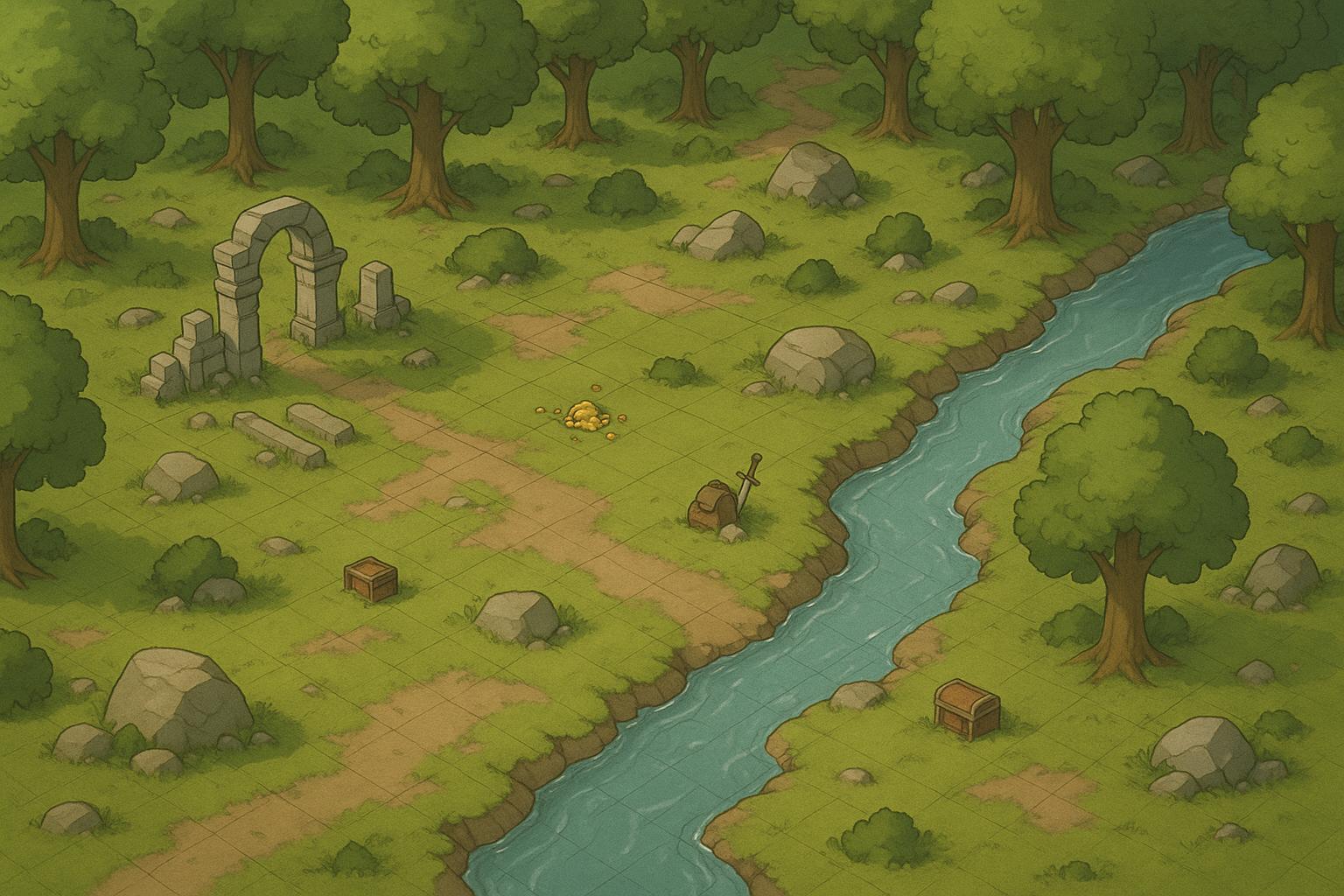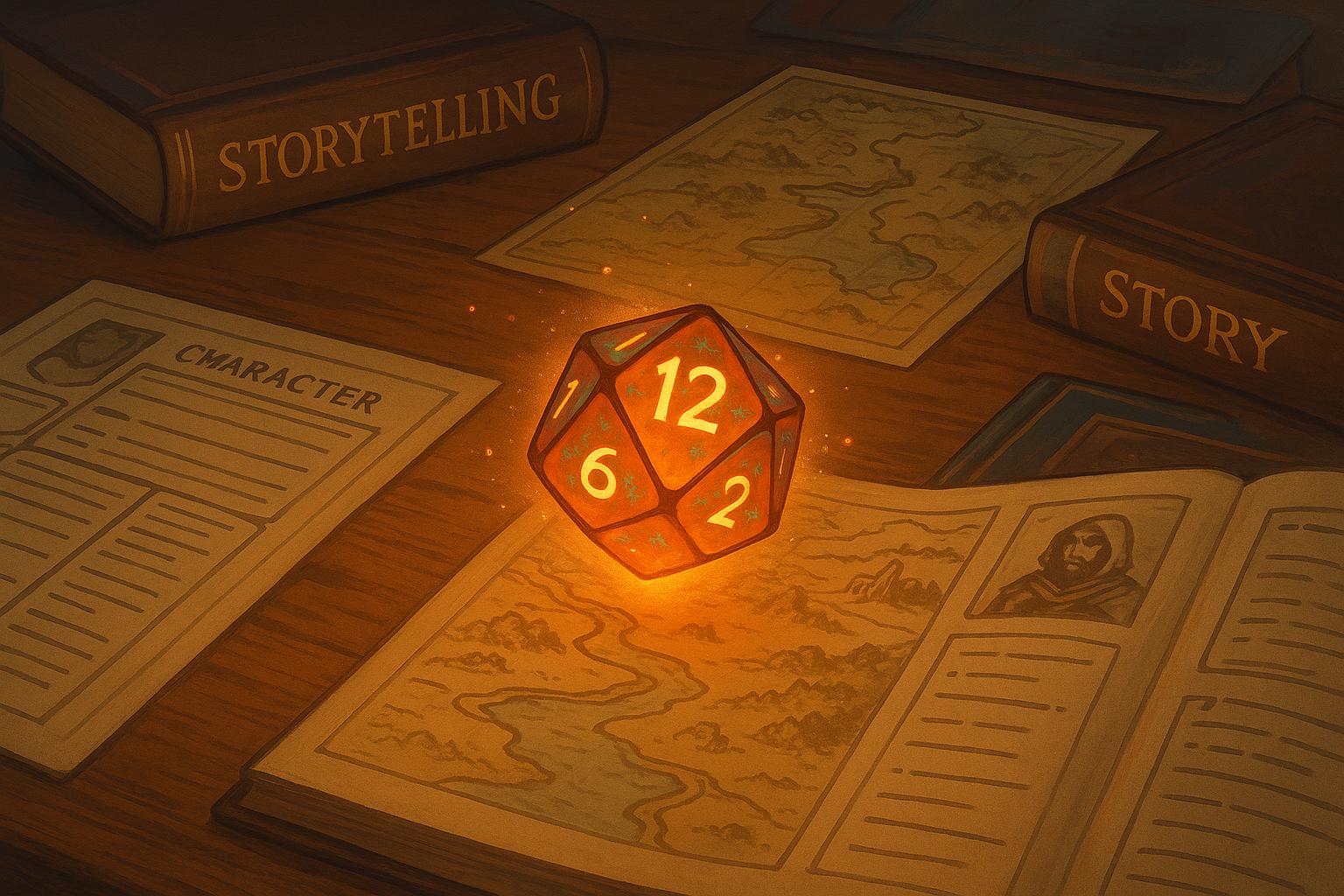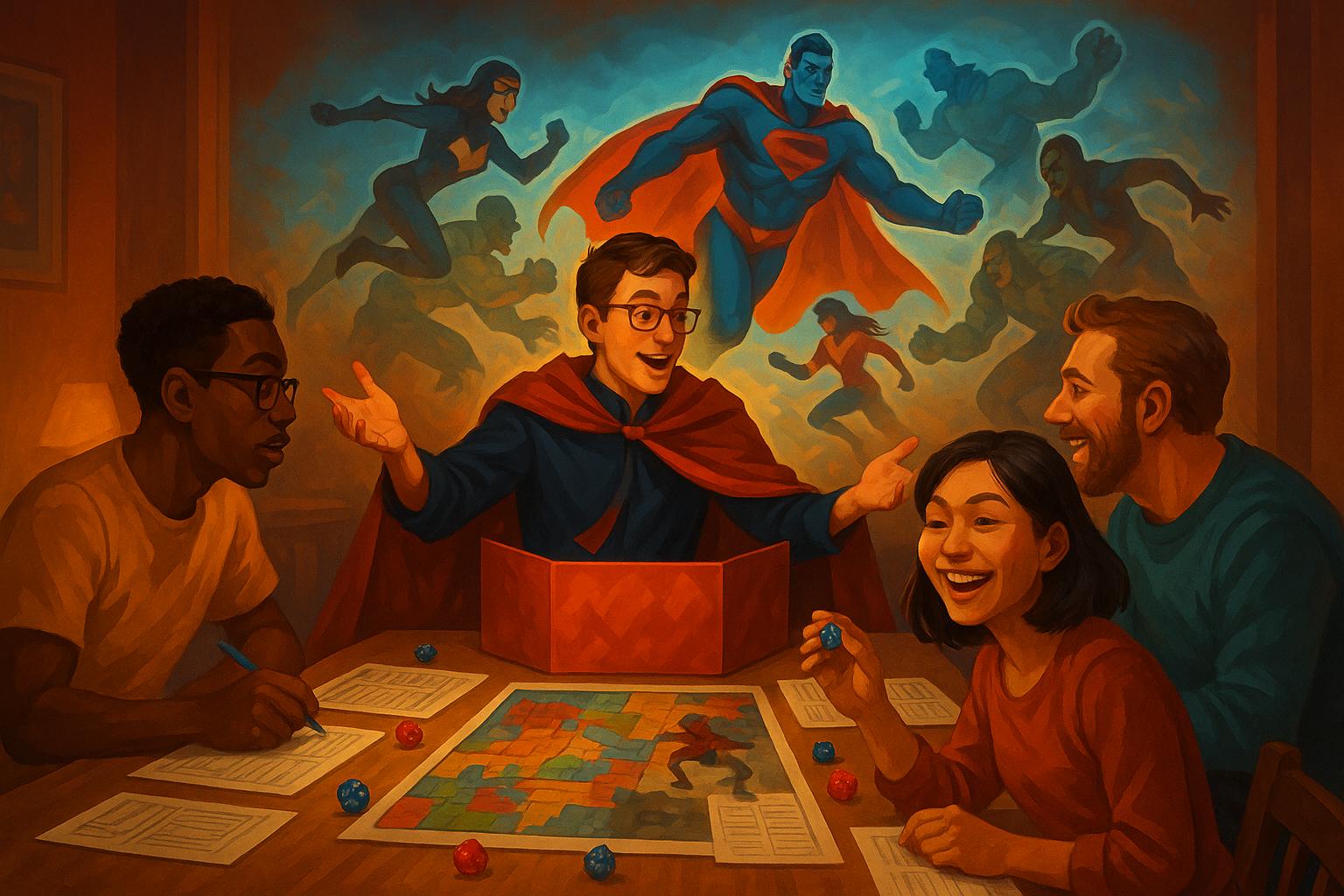Rules-light tabletop RPGs are perfect for quick, story-driven adventures without complex rules or lengthy setups. They’re ideal for one-shots, new players, or groups that prioritize creativity over mechanics. Here are five standout systems:
- FATE Accelerated: Focuses on character-driven storytelling with flexible mechanics like Approaches and Aspects. Great for various genres.
- Lasers & Feelings: A one-page system using a single number to balance logic and emotion. Perfect for quick, adaptable games.
- Risus: Uses clichés for character creation, offering quirky, genre-flexible gameplay with simple dice mechanics.
- GURPS Lite: A simplified version of GURPS, offering tactical depth and realism across multiple genres.
- Cloak and Dagger: Tailored for spy fiction, focusing on espionage themes and covert operations.
Quick Comparison:
| System | Setup Time | Learning Curve | Genre Flexibility | Storytelling Focus | Tactical Depth |
|---|---|---|---|---|---|
| FATE Accelerated | 30-45 mins | Moderate | High | High | Medium |
| Lasers & Feelings | 5-10 mins | Very Easy | High | Good | Low |
| Risus | 15-20 mins | Easy | High | Good | Low |
| GURPS Lite | 45-60 mins | Moderate | High | Fair | Medium-High |
| Cloak and Dagger | 20-30 mins | Easy | Low | Good | Low-Medium |
Choose based on your group’s preferences - whether you want fast, simple play or a bit more tactical depth.
Crunchy vs Rules Light
1. FATE Accelerated
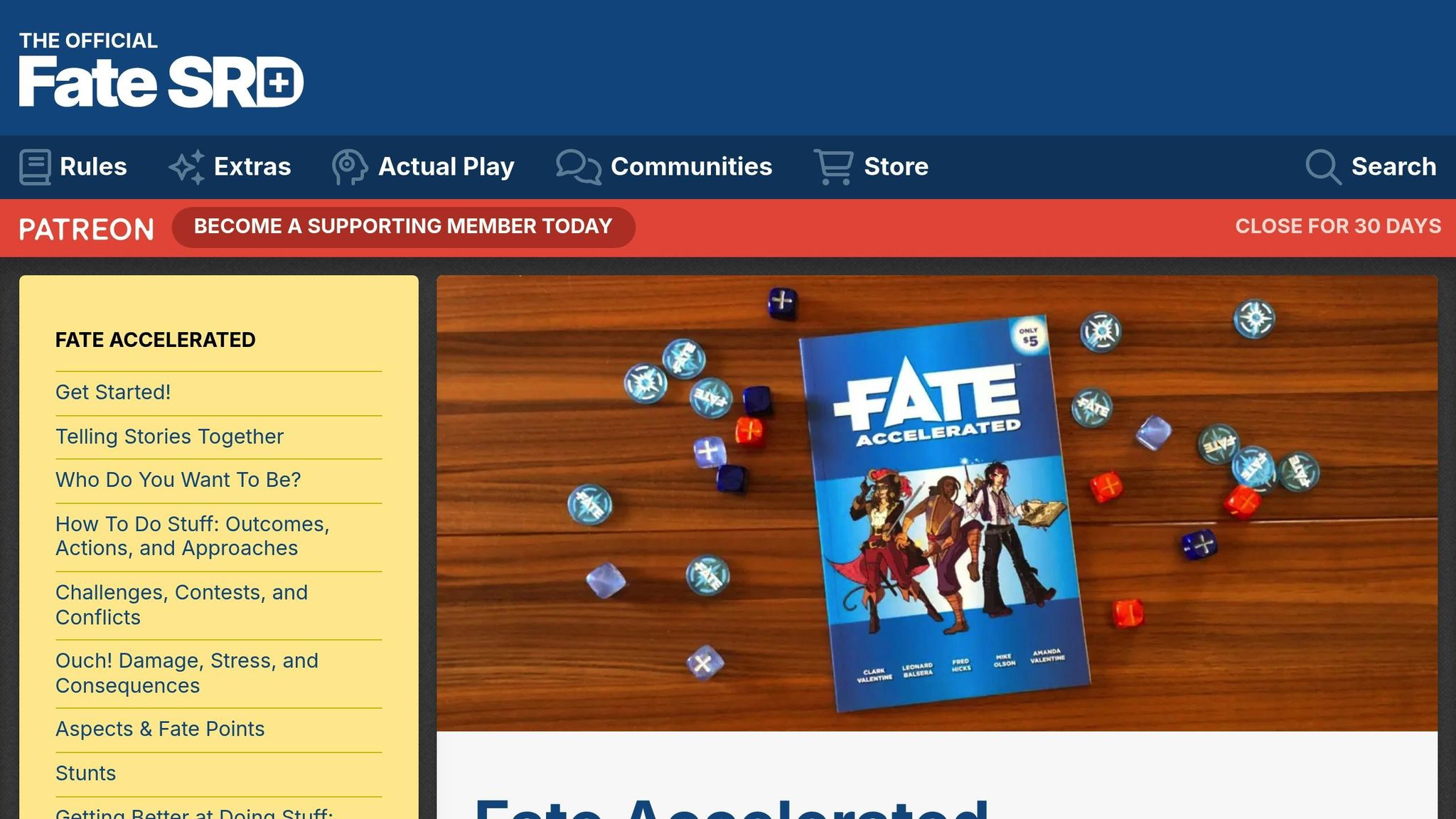
FATE Accelerated (FAE) is a lightweight tabletop role-playing system that puts storytelling and character-driven action front and center. Instead of bogging players down with lengthy stat sheets, it focuses on how characters act and react in the story.
At the heart of FAE is its Approaches system. Rather than relying on a long list of skills, characters are defined by six descriptive styles of action: Careful, Clever, Flashy, Forceful, Quick, and Sneaky. This not only speeds up character creation but also emphasizes personality and play style over technical details.
Another key feature is the use of Aspects - short, descriptive phrases that define characters, scenes, or situations. These phrases aren't just for flavor; they actively shape the story. Players can use them to influence the narrative, making their actions feel more tied to the world and their character's identity.
When resolving actions, players roll four Fate Dice (4dF) and add their relevant Approach rating. The result is compared to the opposition's difficulty, creating outcomes that are straightforward yet varied enough to keep things interesting.
FAE also introduces Fate Points, a type of in-game currency that players can spend to invoke Aspects for bonuses or add twists to the story. These points encourage a balance between a character's strengths and weaknesses, making the game feel dynamic and unpredictable.
Thanks to its simplicity, FAE works well across a range of genres, from futuristic space adventures to gritty urban fantasy. Its easy-to-learn mechanics make it a great choice for beginners, while its focus on collaborative storytelling offers plenty for seasoned players to enjoy.
2. Lasers & Feelings
Lasers & Feelings is a shining example of how simple rules can lead to exciting gameplay. Created by John Harper, this tabletop RPG fits entirely on one page and can be set up and played in just a few minutes.
At the heart of the game is a single number between 2 and 5. This number determines where your character lands on the spectrum between "Lasers" (representing logic, science, and technical skills) and "Feelings" (representing empathy, intuition, and emotional insight). Actions are resolved by rolling a six-sided die. For tasks relying on Lasers, you aim to roll below your number, while for Feelings-based actions, you want to roll above it.
Creating a character is quick and straightforward. Players choose their number, select a role from options like "Doctor", "Envoy", or "Soldier", and decide on a personal goal. There’s no need to track extensive skills or inventory, which keeps the focus firmly on storytelling and action.
The game’s flexibility is one of its most engaging features. The same task can be approached in different ways depending on how a player describes their actions. For instance, hacking a computer could be a Lasers roll if you’re coding, or a Feelings roll if you’re trying to understand the programmer’s intent. This duality encourages creativity and keeps gameplay dynamic.
While originally designed for spacefaring adventures, Lasers & Feelings can be easily adapted to other genres. Whether you’re diving into fantasy with "Swords & Scrolls", exploring martial arts themes with "Fists & Hearts", or venturing into steampunk with "Gears & Souls", the core mechanics remain the same, with just a thematic twist.
The game thrives on collaborative storytelling. With minimal rules, players can focus on describing their actions and shaping the narrative, while the GM has plenty of freedom to interpret rolls and steer the story. This makes sessions feel fluid and engaging for everyone involved.
Because of its simplicity, Lasers & Feelings is an ideal choice for convention one-shots, introducing new players to roleplaying, or even as a quick backup when your regular game night plans fall through. Its fast setup and easy-to-grasp mechanics make it perfect for spontaneous play.
3. Risus
Risus takes a refreshing approach to roleplaying by using a cliché-based system that simplifies character creation while still allowing for plenty of depth. Designed by S. John Ross and available for free, this "Anything RPG" thrives on its simplicity and adaptability, making it a standout choice for gamers who value quick setup and creative gameplay.
At the heart of Risus are clichés - archetypes like "Grizzled Space Marine" or "Absent-Minded Professor." Each cliché is rated between 1 and 6 dice, reflecting how skilled or experienced the character is in that role. When a character faces a challenge, they roll the number of six-sided dice assigned to the relevant cliché, aiming to meet or exceed a target number set by the Game Master.
Creating a character is lightning-fast. Players start with 10 dice and distribute them among their chosen clichés, with no single cliché exceeding 4 dice. For example, you could create a character who’s a "Sneaky Burglar (4)", "Former Circus Acrobat (3)", "Charming Rogue (2)", and "Amateur Chef (1)." This straightforward system highlights a character's strengths without the need for complicated skill lists or abilities.
The real charm of Risus lies in how its clichés adapt across various situations. A "Mad Scientist" might use their cliché to invent gadgets, decipher alien tech, or even intimidate someone with bizarre theories. This encourages players to get inventive, solving problems in unexpected and often entertaining ways.
Combat sticks to the same simple mechanics. Opponents roll their relevant clichés, and the side with the higher total wins. The loser reduces their cliché by one die, symbolizing fatigue or damage. This creates an organic sense of escalation, as battles grow more intense with each roll.
One of Risus’s greatest strengths is how easily it adapts to different genres. Whether you’re diving into a fantasy quest, navigating a modern spy thriller, battling supervillains, or even roleplaying something abstract like "Corporate Politics" or "High School Drama", the cliché system molds itself to fit the setting. This makes it a fantastic tool for Game Masters who enjoy experimenting with new themes and scenarios.
For those looking to add a bit more strategy, Risus includes optional rules for teams and pumping. Teams allow players to combine their efforts for a greater impact, while pumping lets them temporarily boost one cliché by risking dice from another.
Another big win for Risus is its minimal preparation time. Game Masters don’t need to create extensive stat blocks or intricate encounters. Instead, they just assign clichés to NPCs and challenges, making it easy to jump straight into the action.
Learning Risus is a breeze - most players can pick up the rules in under 10 minutes. Its focus on storytelling and creative problem-solving over mechanical optimization makes it an excellent choice for newcomers and seasoned players alike. Whether you’re running a quick one-shot or introducing someone to roleplaying for the first time, Risus delivers an engaging and flexible experience that’s hard to beat.
sbb-itb-b8b00a5
4. GURPS Lite
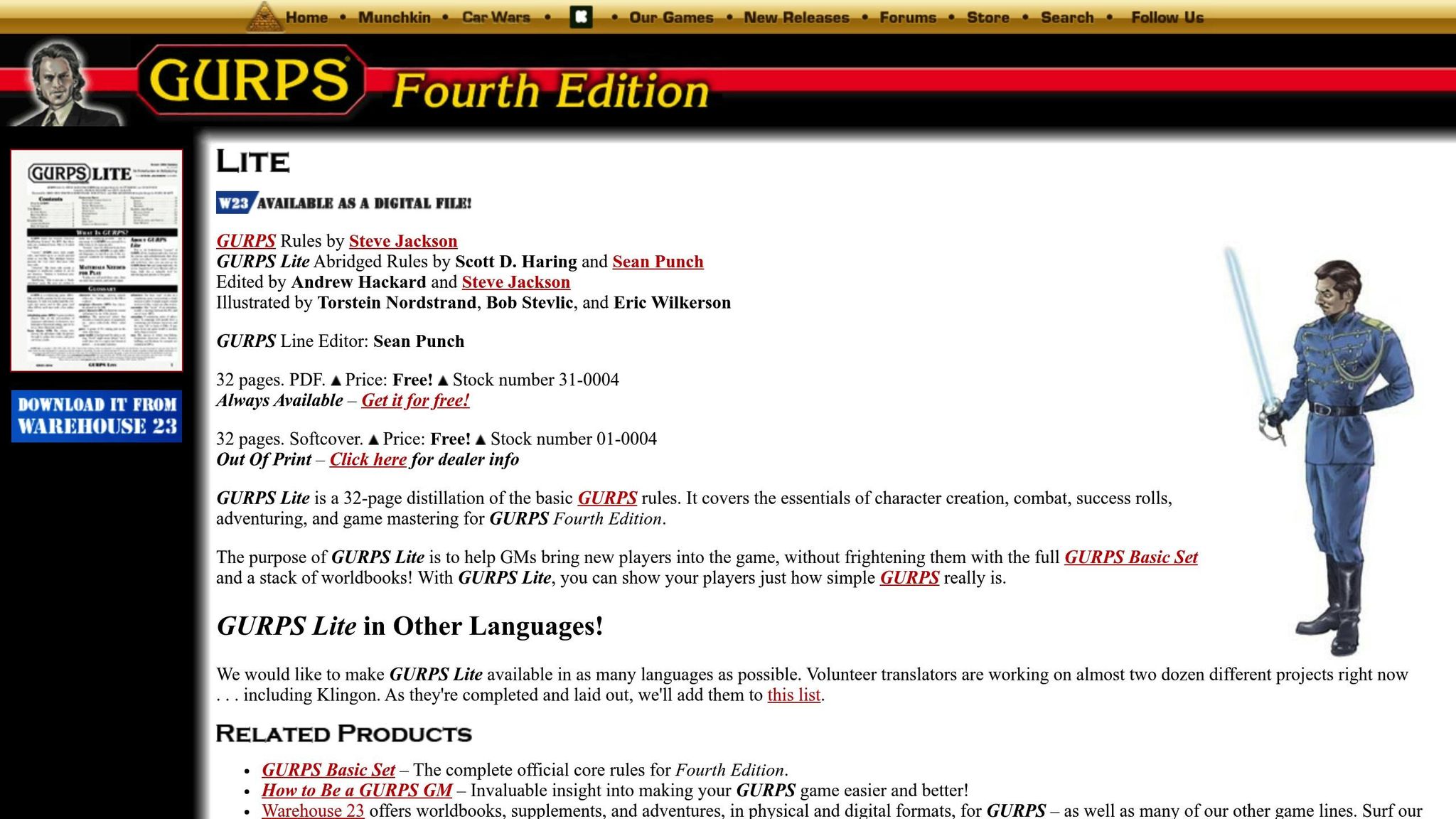
GURPS Lite is a streamlined version of the Generic Universal RolePlaying System, designed to make the complex mechanics of GURPS more approachable. Published by Steve Jackson Games and available as a free download, it retains the tactical depth and precision that GURPS is known for, while simplifying the parts that might overwhelm new players. Let’s dive into how GURPS Lite balances simplicity with depth compared to other rules-light systems.
At its core, the system revolves around four main attributes: Strength, Dexterity, Intelligence, and Health. These typically range from 8 to 12 for an average character. Players use a point-buy system - usually around 100–125 points - to adjust these attributes and acquire skills, advantages, and disadvantages. Skills are tied to these core attributes, and success is determined by rolling three six-sided dice (3d6). The goal? Roll at or below your skill level. This 3d6 system creates a bell curve of probabilities, making outcomes feel more predictable and intuitive compared to single-die systems.
Unlike systems that rely on broad archetypes or clichés, GURPS Lite defines skills with precision. For example, instead of a generic "Shooting" skill, it offers specific options like Guns (Pistol) or Computer Operation. This level of detail gives players clear tactical choices and allows for meaningful distinctions between different areas of expertise - perfect for those who enjoy a more granular approach to gameplay.
The combat and damage mechanics are grounded in realism. Characters track hit points, and injuries can result in effects like stunning, knockdowns, or more severe consequences. This adds a layer of tactical decision-making, as the stakes in combat feel tangible and impactful.
One of GURPS Lite’s standout features is its versatility. The core mechanics work seamlessly across genres, meaning Game Masters don’t need to learn new systems or convert rules when switching between, say, a sci-fi setting and a medieval fantasy world. This flexibility makes it a go-to choice for groups that enjoy exploring different genres without jumping between entirely different rulebooks.
However, this depth comes with a tradeoff. GURPS Lite demands more time for character creation and preparation than ultra-light systems. Building a character can take 30–45 minutes, compared to the quick 5–10 minutes needed for games like Lasers & Feelings. Game Masters also need to invest more time upfront, preparing detailed NPC stat blocks and planning tactical encounters. While it leans heavily on simulation - focusing on "what happens" - it’s less concerned with crafting a narrative-driven experience.
Ultimately, GURPS Lite is ideal for groups looking for a balance between tactical gameplay and accessibility. It serves as a middle ground, offering strategic depth without the full complexity of the original GURPS system, making it a great choice for players who want more than a simple narrative system but aren’t ready to dive into the deep end of crunch-heavy mechanics.
5. Cloak and Dagger
Cloak and Dagger pulls players into the thrilling world of espionage with a streamlined system tailored for spy fiction. It captures the essence of secret agent adventures - tense moments, deception, and high-stakes covert operations. The game’s mechanics are built to bring espionage scenarios to life, offering a quick and adaptable framework. It's perfect for groups looking to dive into spy-themed storytelling without getting bogged down by overly complex rules.
Comparison of Strengths and Weaknesses
Rules-light TTRPGs come with their own set of strengths and trade-offs, making the choice largely dependent on your group's playstyle and preferences.
FATE Accelerated stands out for its focus on collaborative storytelling, thanks to its aspect system that lets players actively shape the narrative. It uses descriptive approaches like Forceful or Sneaky to simplify character creation. However, this narrative-driven approach can feel daunting for those who prefer clear-cut mechanics, and the fate point system requires players to stay engaged with the story at all times.
Lasers & Feelings shines with its simplicity. This one-page system gets you playing within minutes, making it perfect for newcomers or quick sessions. While its accessibility is a major plus, the minimal mechanics can feel limiting for longer campaigns, leaving some players craving more structure.
Risus offers a flexible, cliché-based character system that’s both functional and packed with personality. For example, creating a character like "Grizzled Space Marine (4)" immediately conveys both narrative flavor and mechanics. Its ability to adapt to any genre is a strong point, but the repetitive dice-rolling mechanics in conflicts can make combat feel a bit monotonous.
GURPS Lite provides a balance between tactical depth and streamlined rules. Its point-buy character creation system and detailed skill options offer satisfying progression and strategic gameplay. This makes it a solid choice for groups transitioning from more complex systems. However, its learning curve is steeper compared to other minimalist games.
Cloak and Dagger is tailored for spy fiction, with mechanics that focus on espionage staples like cover identities and information gathering. This specialization immerses players in spy-themed adventures but limits the system’s flexibility for other genres.
Here’s a quick comparison of these systems to help you decide:
| System | Setup Time | Learning Curve | Genre Flexibility | Storytelling Support | Mechanical Depth |
|---|---|---|---|---|---|
| FATE Accelerated | 30-45 minutes | Moderate | High | Excellent | Medium |
| Lasers & Feelings | 5-10 minutes | Very Easy | High | Good | Minimal |
| Risus | 15-20 minutes | Easy | Excellent | Good | Low |
| GURPS Lite | 45-60 minutes | Moderate | High | Fair | Medium-High |
| Cloak and Dagger | 20-30 minutes | Easy | Low | Good | Low-Medium |
Your choice will depend on what your group values most. If you’re after a system that prioritizes narrative control, FATE Accelerated is a great pick. For quick, easy-to-learn gameplay, Lasers & Feelings is hard to beat. Risus appeals to those who love crafting quirky, creative characters, while GURPS Lite provides satisfying mechanical depth for players who enjoy tactical options. If spy fiction is your jam, Cloak and Dagger is the way to go.
Also, think about your session length. For one-shots, systems with minimal setup are ideal. For campaigns, investing in a slightly more complex system can pay off with richer gameplay over time. Ultimately, the best rules-light system is the one that fits your group’s style and the time you have to play.
Final Thoughts
Rules-light tabletop role-playing games (TTRPGs) offer a refreshing alternative to more intricate systems, proving that simplicity can often lead to deeper, more engaging gameplay. These streamlined games shine by getting players into the action quickly, often with just 5 to 60 minutes of preparation.
Their simplicity allows creativity to take center stage. By stripping away the need to memorize complex mechanics, these systems make it easier for new players to jump in and encourage everyone to focus on storytelling and improvisation rather than rule-checking.
Take FATE Accelerated, for example - it gives players the tools to actively shape the narrative. Lasers & Feelings gets you rolling in minutes, while Risus embraces quirky, imaginative character concepts. GURPS Lite strikes a balance between simplicity and tactical depth, and Cloak and Dagger is perfect for espionage enthusiasts. With such a variety of options, there's something for every storytelling style.
Experimenting with multiple systems can help you find the best fit for your group. Some players thrive with minimal rules and maximum creativity, while others might prefer a touch more structure to feel at ease. Factors like session length, player experience, preferred genres, and how much time you want to dedicate to character creation versus gameplay can all influence your choice. The beauty of rules-light systems is their flexibility - most require little time or effort to learn, making it easy to switch between systems based on the story, mood, or time you have available.
These games aren’t just convenient - they’re a reminder of what makes tabletop gaming special. The best moments often come not from perfectly balanced rules but from the creativity, collaboration, and chemistry shared around the table.
FAQs
What makes rules-light TTRPG systems a great choice compared to more complex ones?
Rules-light tabletop role-playing games (TTRPGs) are a fantastic option for anyone looking for a straightforward and hassle-free gaming experience. These games are quick to pick up and teach, so you can dive into the fun without wading through pages of dense rulebooks. This simplicity makes them a great fit for beginners or groups that don’t have a lot of time to spare.
What sets these systems apart is their focus on flexibility and imagination. Instead of getting bogged down in complicated rules, players and game masters can channel their energy into storytelling and improvisation. With minimal prep needed, they’re perfect for impromptu sessions or shorter campaigns. If you enjoy fast-paced adventures and the freedom to adapt on the fly, rules-light TTRPGs are an excellent way to play.
How do I choose the right rules-light TTRPG for my group's playstyle and preferences?
To find the perfect rules-light TTRPG for your group, start by thinking about how your group likes to play. Are they all about fast-paced, story-driven sessions? Or do they lean toward something with a bit more structure? Fate Accelerated is an excellent choice for groups that thrive on storytelling, while Lasers & Feelings keeps things simple and fun with its easy mechanics, making it ideal for lighthearted adventures. For newcomers to tabletop RPGs, consider systems like Polar Fudge Adventures, which are straightforward and beginner-friendly.
Also, factor in your group's experience with RPGs, the kind of stories you want to explore, and how much time you can dedicate to setup and gameplay. Choosing a system that aligns with your group's style and preferences will make sure everyone has a great time.
Are rules-light tabletop RPGs better for short sessions, or can they work for long campaigns too?
Rules-light tabletop RPGs shine when it comes to one-shots or short campaigns, thanks to their straightforward mechanics and quick setup. These systems are designed to let players jump into the action almost immediately, making them a great fit for casual or time-crunched gaming sessions.
Some groups, however, manage to stretch these systems into long-term campaigns by tweaking the rules or tailoring gameplay to suit their style. While this approach can work, it does come with potential hurdles, such as limited character progression or challenges in maintaining narrative complexity over time. With thoughtful adjustments, though, these games can still deliver an engaging experience, even for extended adventures.
